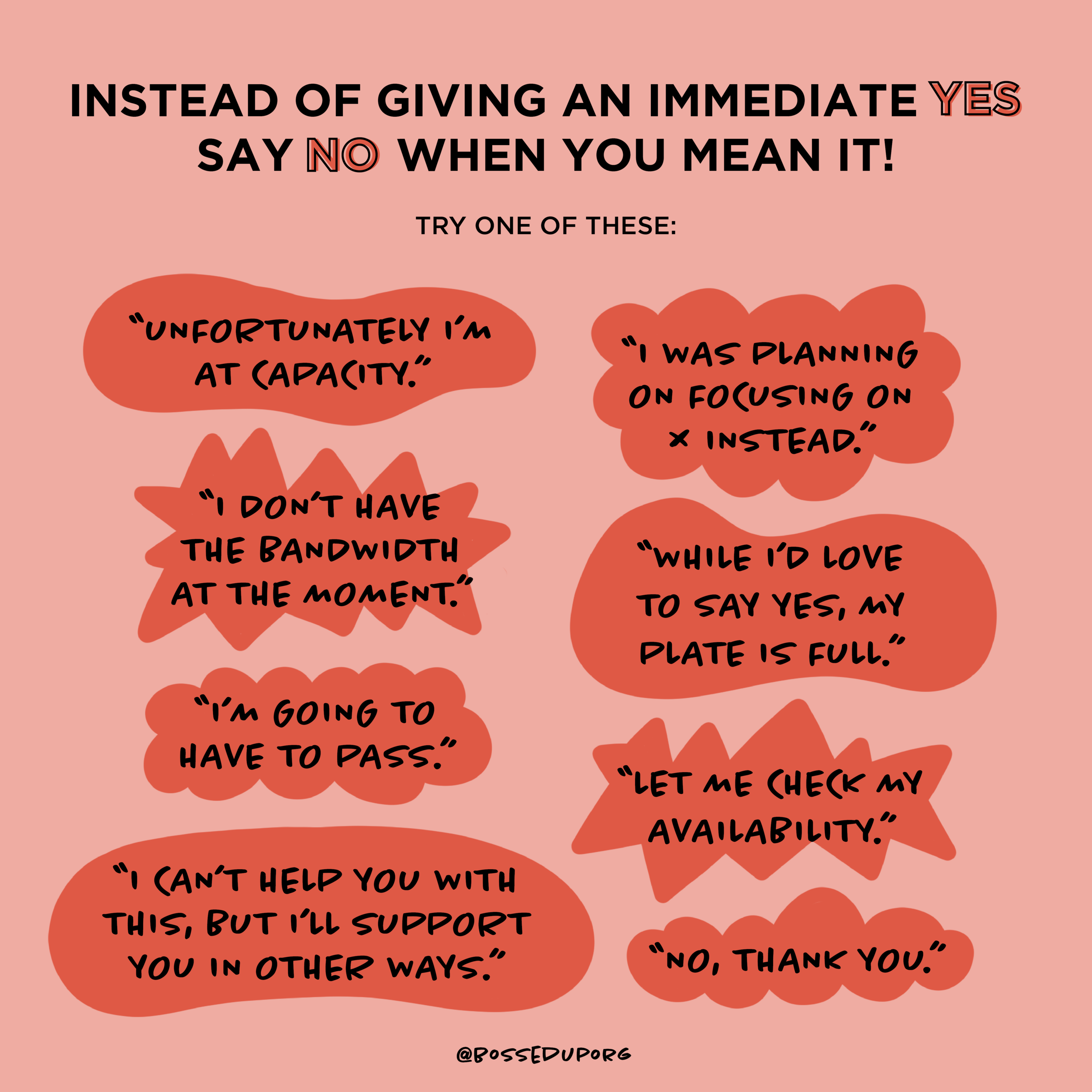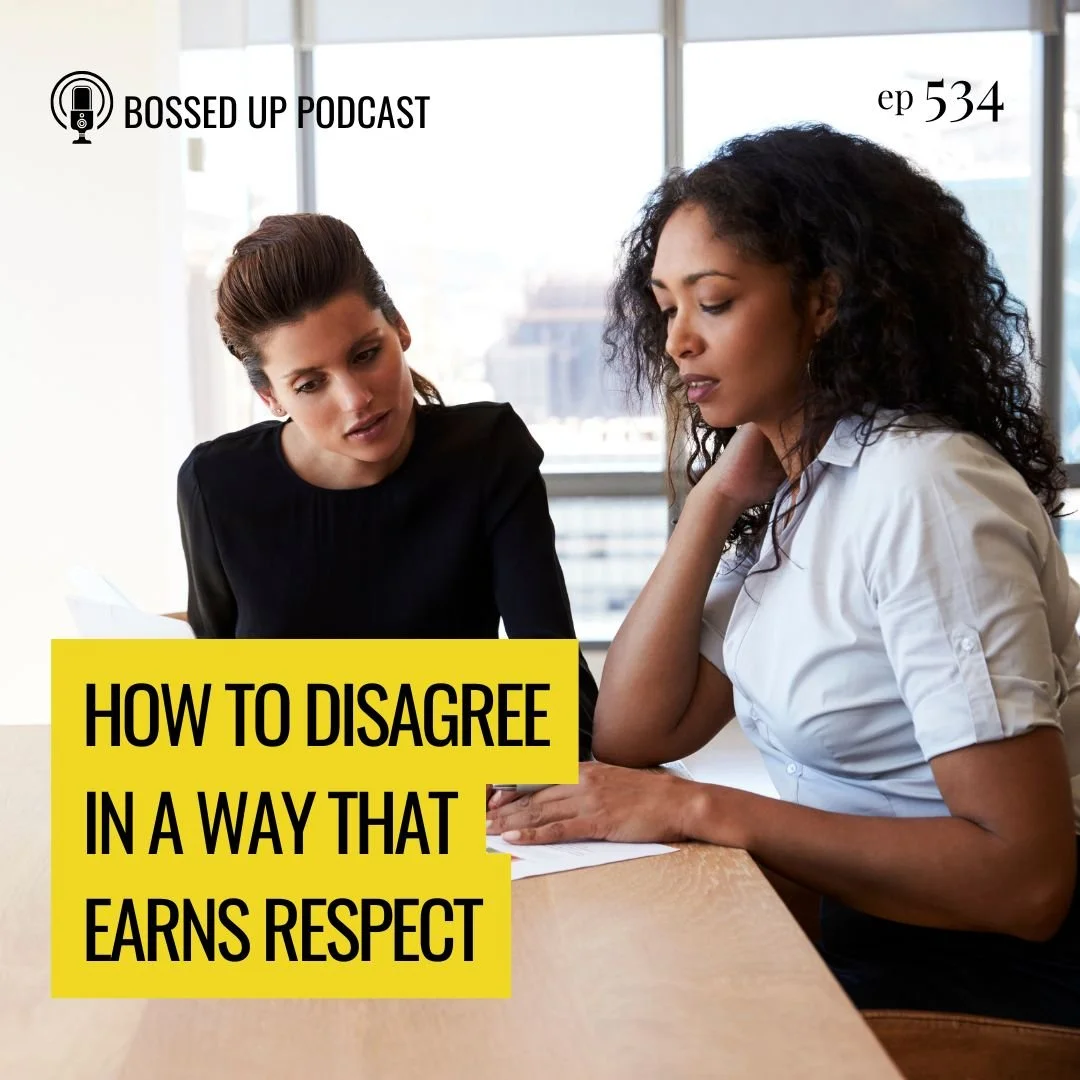How to Say “No” and Stop Overcommitting
Episode 301 | Author: Emilie AriesAre you a chronic over-committer?
I’ve spent years working to curb the habit I call “aspirational planning,” where I constantly overestimate how much I can get done in a short period of time, only to kick myself later when all my deadlines are converging at once.
Maybe you find yourself instinctively agreeing to a get-together with family or friends that actually pulls you away from a pressing priority at work that needs your attention, only to find yourself grumbling and distracted throughout the event, unable to be present and enjoy your company. Or perhaps you eagerly agree to take on a special project at work, knowing full well that your other - arguably more important - projects will suffer as a result.
This desire to be agreeable and well-liked, which is a fundamental human instinct, can seriously hamper our ability to stay focused on what is most important. While it seems innocuous at first, our biggest, most audacious goals become subject to death by a thousand cuts. Our proclaimed priorities, constantly sidelined by other people’s demands on your time, become an afterthought.
As we round out the month of January, at which point, statistically speaking, most of our New Year’s resolutions have been abandoned, I want to share what I’ve learned about how to say “no” and stop over-committing.
First, identify the fear.
I find that the habit of over-committing usually masks some kind of fear. Perhaps it’s the fear of missing out, the fear of disappointing ourselves or others, the fear of future regret, or the fear of being “less than” you think you should be.
What is the narrative in your mind that causes your over-commitment?
Write it down. Question it. Is it actually true? Is this belief serving you?
If not, script a response - a logical counterpoint. Turn that argument into a mantra that you can turn to when you’re faced with a choice moment.
Then, practice mindfully saying no:
The next time you’re considering how much to take on and what goals you’re going to focus on for any given day, week, or month, take these principles to heart to help you say “no” more often:
take a beat
The first challenge is to create that moment of mindfulness. Curb your instinct to say “yes” right away. Instead, get in the habit of taking a breath, and saying to that demand on your time, “Let me check on my capacity and get back to you.” The goal here is to become more and realistic with your projections of your time. To do that, you need to get in the habit of asking for time to think - even just a few seconds - before you immediately agree.
Come up with an assessment to help you decide.
Sometimes it’s hard to decide what warrants your focus and what doesn’t. Saying “no” to something you don’t want to do is easier, in many ways, than saying “no” to an opportunity that’s exciting, but still incredibly time-consuming. So how do you deduce exactly what will help further your vision for the life and career you want and what will just distract you from it?
Brad works for a custom cabinetry company here in Denver, and lately they’ve been absolutely overwhelmed with inquiries for work. Like many small businesses, mine included, they’ve had to learn the hard way which jobs to take on and which become more of a headache than they’re worth. They have wonderful, quick, 3-question assessment to help them decide which jobs to take on and which to pass on:
They ask themselves this:
First, will it make us money?
Second, will we learn something?
Third, will it serve as a signature portfolio piece?
If the answer is “no” to two or more of these questions, they politely decline and send their prospective client over to other shops that might be better able to take the work on.
I love this example of an assessment, because it’s simple. These 3 quick questions help provide a gut check as to whether or not this potential project furthers the overall goal of the organization: to do groundbreaking work, to master their craft, and to make some money along the way.
Now think back to your intentions for the year. Perhaps like our LifeTracker Planner users, you set a one-word intention for how you want your year to go. Or you might review your long-term goals on a monthly basis. Whatever you do, you’ve got to keep the big picture in mind when deciding what to say “yes” to and what warrants a “no.”
Ask yourself: does taking on this project serve my long-term goals? Does this align with my word of the year? Does this align with my values for how I want to spend my time right now? Is there a longer-term benefit, like building an important relationship or learning something?
Whatever it is, create your own rubric for deciding. Write it down as your own little guide to saying “no,” and keep it somewhere you can turn to easily wherever you often find yourself saying “yes” too readily.
When you decide to say no, say no!
Instead of giving an immediate yes - try saying no when you mean it! There are lots of ways to say “no.” Try one of these:
“Unfortunately I’m at capacity.”
“I was planning on focusing on X instead.”
“I don’t have the bandwidth at the moment.”
“While I’d love to say yes, my plate is full.”
“I’m going to have to pass.”
“No, thank you.”
“Let me check my availability.”
“I can’t help you with this, but I’ll support you in other ways.”
Pin me and save for later!
Practice a variety of ways of saying no and you’ll find what works best for you over time.
You either set boundaries proactively or reactively.
At the end of the day, you only have so much time, energy, and effort to devote to your goals this year.
We must embrace saying “no” up front in a mindful, strategic, and proactive way, or find ourselves floundering later, buried in overwhelm and role overload, kicking ourselves for not setting more boundaries up front.
As Essentialism author Greg McKeown put it recently on the Bossed Up podcast, “Every yes is a no to many things.” I’d argue that the converse holds true as well: every no is a yes to many things, too.
So this year, let’s commit to our commitments by saying “no” to everything else.
If you’re looking for help in setting mindful boundaries and clarifying your plan to achieve your biggest goals this year, the Bossed Up LifeTracker Planner can help. Snag one of final remaining copies for 2021 here before we sell out.
SNAG YOUR PLANNER NOW
Got a career conundrum you want Emilie to cover on the podcast? Call and leave us a voicemail NOW at 910-668-BOSS(2677).















